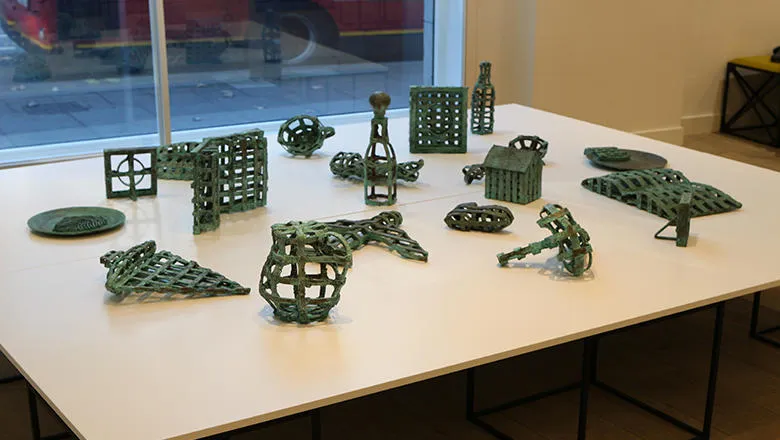Reconciliations
Reconciliations is a major public exhibition running in parallel at the Exchange, Bush House from 1 November-1 December...
31 October 2018
Researchers at King's College London have teamed up with artists to explore the role of the arts in the reconciliation of populations affected by the Western Balkans conflict in the 1990s. The Reconciliations exhibition launches at King's on 1 November 2018.

Researchers at King's College London have teamed up with artists to explore the role of the arts in the reconciliation of populations affected by the Western Balkans conflict in the 1990s. The Reconciliations exhibition launches at King's on 1 November 2018.
Reconciliations is part of a major AHRC-funded project, ‘Art & Reconciliation: Conflict, Culture and Community’, led by King’s in collaboration with the University of the Arts London and the London School of Economics. It is a two-part exhibition running in parallel at the Exchange, Bush House, King’s College London from 1 November-1 December 2018, and at the Knapp Gallery, Regent’s University London, from 1 November 2018-19 January 2019.
“The problem of reconciliation remains one of the most elusive and contested concepts in the fields of post-conflict reconstruction, peace-building and transitional justice,” said Dr Rachel Kerr, Reader in International Relations and Contemporary War at King’s College London and Art and Reconciliation Principal Investigator.
“Reconciliation is a problematic concept often not accepted by those directly affected by recent conflict, such as the Western Balkans. Billions have been invested in reconciliation projects there but organisations like UNDP have little evidence on whether or not this has worked.”
“Art and Reconciliation is unique in bringing together history, the arts and social science to explore new avenues to reconciliation via the arts. It uses innovative methodologies to ‘map’ reconciliation activity, create and evaluate arts and artistic practices and conduct close interrogation of discourses of reconciliation.
Art and Reconciliation explored the politics of reconciliation across the Western Balkans and beyond from a variety of perspectives in three strands, History, Discourse and Practice. The exhibitions offer a chance to see the specific project art commissions, as well as other works relating to the broader concept of ‘reconciliation’.
Reconciliation remains a key challenge for the countries and peoples of the Western Balkans region, where the series of conflicts in the 1990s, in Slovenia, Croatia, Bosnia and Kosovo claimed over 140,000 lives and affected many more. The International Criminal Tribunal for the Former Yugoslavia, which closed last year, delivered a measure of justice, which for many was necessary and important, but also insufficient.
In spite of the judicial and historical record established by the trial, narratives of victimhood and denial remain entrenched and the politics of the region continue to be ethnically and nationally divisive. Meanwhile, a great deal of money and effort have been expended on reconciliation projects, with little systematic knowledge about their outcomes.
Researchers from King’s College London, University of the Arts London and the London School of Economics worked with partner organisations in the region, the Historical Museum of Bosnia and Hercegovina and Stacion – Institute of Contemporary Arts Kosovo, and with artists based in the region on a series of direct commissions and open calls to produce artwork responding to the them of reconciliation.
“Reconciliations is an opportunity for social science at King’s to present itself in new ways and to engage with new audiences, both from King’s and from our London communities. This exhibition is an important window onto the work we do at King’s, allowing us to bring research and engagement together in novel ways,” said Professor Frans Berkhout, Executive Dean of the Faculty of Social Science & Public Policy.
The exhibitions are a chance to see the project art commissions and well as other works relating to the broader concept of ‘reconciliation’. Works commissioned for the Reconciliation exhibition include the photographer Ziyah Gafić’s film, Rope, exploring his own father’s reconciliation with old friends who fought on opposite sides of the conflict in Bosnia, a beautiful and intricate set of 38 ink drawing reproductions of newspaper coverage and other archival material by Vladimir Miladinović, Rendered History, and London-based artist, Paul Coldwell’s moving response to the story of a 7-year old by killed by a sniper in Sarajevo at the height of the siege, A Life Measured; Seven sweaters for Nermin Divović.
Reconciliations events programme.
Exchange, Bush House, NE Wing, 30 Aldwych, 9-6pm, Monday-Friday, FREE entry
Reconciliations is a major public exhibition running in parallel at the Exchange, Bush House from 1 November-1 December...